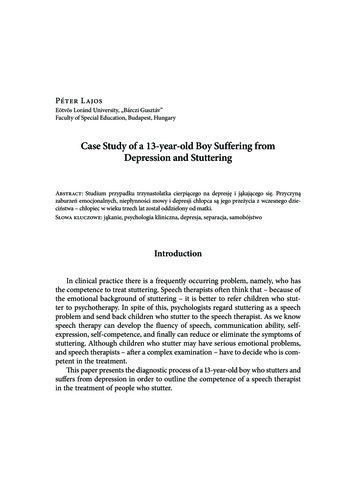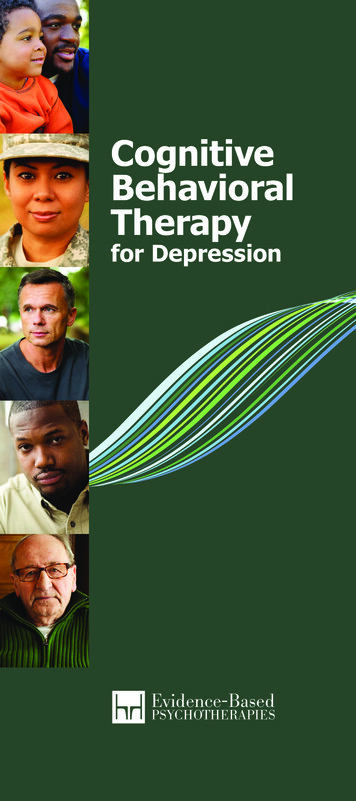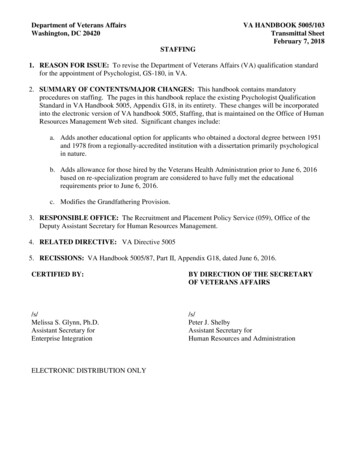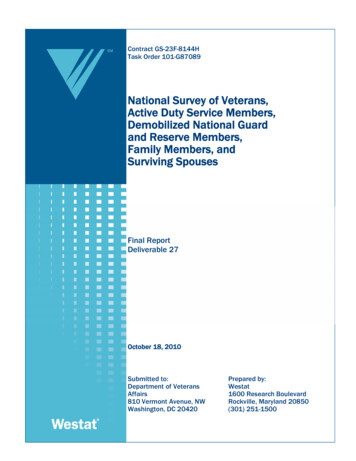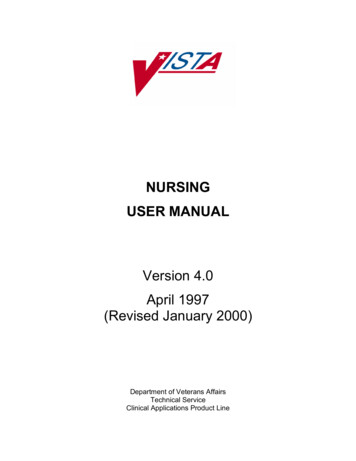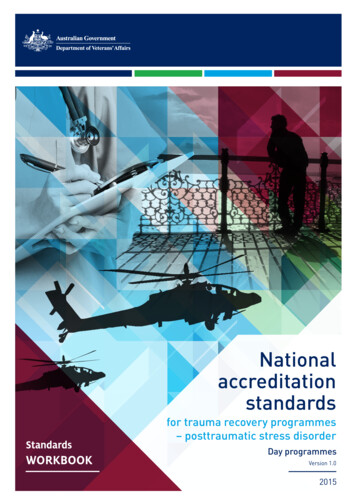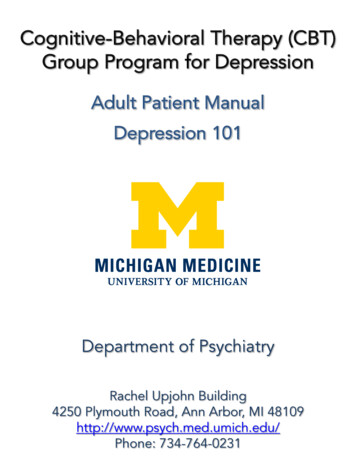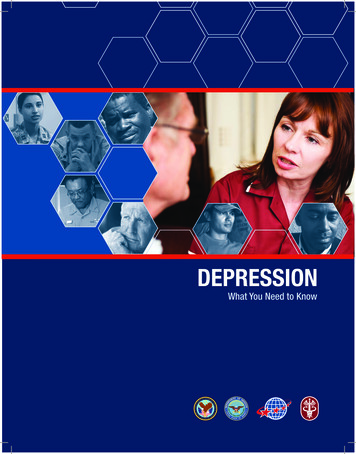
Transcription
DEPRESSIONWhat You Need to Know
Fast Facts on Depression: Depression is one of the most common and treatable mental health disorders. Almost 10 percent of Americans have depression in a given year. Depression is the leading cause of disability in the U.S. for people ages 15 to 44. Major depression can occur in children, teens, and adults. Most patients who have depression can be effectively treated, andthey can return to their normal activities and feelings.This brochure will help you: Recognize the symptoms of depression. Understand the causes of depression. Learn how depression can be treated. Take steps to help you or your loved one feel better. Improve your sleep. Talk with your family and friends about depression.
DEPRESSIONWHAT YOU NEED TO KNOWDEPRESSION IS COMMON. It can affect anyone. It IS NOT a character flaw or mental or physical weakness.Depression is a medical condition. Just like other medical conditions, it can be treated and managed.Effective treatment begins with an open and honest conversation with your health care provider.Depression is more than the temporary sadness orother emotions that often follow a loss or whengoing through difficult times. Depression is a genuinemedical disorder that can affect thoughts, feelings,and behaviors, as well as physical health. People withdepression may experience several of the followingsymptoms nearly every day for at least two weeks. Feeling sad, blue, or down in the dumps Losing interest in activities usually enjoyed Feeling listless or restless Having trouble sleeping or sleeping too much Losing energy or feeling tired all the time Having extreme changes in appetite or weight Having problems concentrating, remembering, ormaking decisions Feeling worthless or guilty Having thoughts of death or of hurting oneselfCauses of Clinical DepressionMany things can contribute to depression. For somepeople, only one factor can cause depression, but for others,several factors are involved. Sometimes, the causes aren’tclear. No matter what the cause, depression needs to bediagnosed and treated. Cognitive—People who have low self-esteem, arepessimistic, worry too much, or feel they have littlecontrol over life events are more likely todevelop depression.Symptoms and CausesMore Than A Passing EmotionSome Causes Biological—Everyone has brain chemicals called“neurotransmitters.” A change in the amounts of thesechemicals may cause depression. People with depressionmay have too much or not enough of these chemicals. Gender—Women are twice as likely to experiencedepression. One of the reasons for this may bebecause women go through hormonal changes duringmenstruation, pregnancy, childbirth, and menopause.Another reason may be that women have many rolesand responsibilities that cause stress. In some cases,women who have experienced abuse or poverty, or whohave low self-esteem may be more likely to developclinical depression. Co-occurrence—People who have certain physicalillnesses, such as stroke, heart disease, cancer,Alzheimer’s disease, diabetes, and hormonal disorders,are more likely to develop clinical depression.Depression can also co-occur in people who experienceother mental illnesses, such as eating disordersor anxiety disorders. It is important to treat bothdepression and the co-occurring physical ormental illness. Drugs or Alcohol Abuse—Alcohol and some drugsof abuse act as depressants and imitate the symptomsof depression.01
TREATING CLINICAL DEPRESSIONDepression is treatable. The sooner you begin treatment, the better the results. Talk to your provider tofind out if you suffer from depression so that you can begin treatment. Don’t be afraid to ask questionsand take an active role in deciding what type of treatment you think will work best for you.No matter which treatment you choose, you will likely getthe best results if you follow your provider’s instructions.If you are an active duty service member, remember thatbeing diagnosed with depression doesn’t automaticallyprevent deployment. Medications are available that can beused during deployment.Self-ManagementTreatments: Self-ManagementIt can often take a few weeks before you feel animprovement from counseling or medications. In themeantime, there are a number of things you can do to helpyourself. See the Self-Management Worksheet (page four)included in this pamphlet for 12 activities that can helpyour depression, such as:1. Engage in fun physical activities and exerciseRegular exercise can improve your mood. Even taking ashort walk every day may help you feel a little better.It’s easy to feel overwhelmed by problems and decisions, andit can be hard to deal with them when you’re feeling sad,have little energy, or aren’t thinking as clearly as usual. Someproblems and decisions can be delayed, but others can’t. Trybreaking down a large problem into smaller ones and thentaking one small step at a time to solve it. Give yourself creditfor each step you take.6. Avoid making major life decisions whilefeeling depressedMajor decisions might include changing jobs, making afinancial investment, moving, divorcing, or making a majorpurchase. If you feel you must make a major decision aboutyour life, ask your care provider or someone you trust tohelp you.7. Eat nutritious, balanced mealsEven though you may not feel as motivated or happy asyou used to, commit to scheduling a fun activity (such as afavorite hobby) at least a few times a week.Many people find that when they eat more nutritious,balanced meals, they not only feel better physically, but alsoemotionally and mentally. To learn about choosing healthyfoods, talk with a Nutritionist or visit the online HealthEating Center available on MyHealtheVet.3. Spend time with people who can support you8. Avoid using alcohol and drugs of abuseIt’s easy to avoid contact with people when you’re feelingdown. But it’s during these times that you actually needthe support of friends and family. Try explaining to themwhat you are feeling. If you don’t feel comfortable talkingabout it, that’s all right. Just asking them to be with you,maybe during an activity, is a good first step. Suggestions:Meet a friend for coffee or to play cards, take a walk with aneighbor, or work in the garden with your spouse.Alcohol is a depressant and can add to feeling down andalone. It can also interfere with the help you may receivefrom antidepressant medication.2. Make time for activities you enjoy4. Practice relaxationFor many people, the changes that come with depressioncan be stressful. Since physical relaxation can lead to mentalrelaxation, try deep breathing; taking a hot shower; orjust finding a quiet, comfortable, and peaceful place. Saycomforting things to yourself like, “It’s going to get better.”025. Pace yourself—set simple goals and take small steps9. Develop healthy sleep habitsSleep problems are common for those with depression.Getting enough sleep can help you feel better andmore energetic.10. Follow your care provider’s instructions about yourtreatment and communicate openlyIt is very important to take your medicine as prescribedeach day and to keep your appointments with your provider,even when you begin to feel better. Ask your provider if youhave any questions or concerns about your treatment. Tellyour provider about your feelings, activities, sleep and eatingpatterns, unusual symptoms, or physical problems.
Some proven and effective methodsfor treating depression n medication11. Tell someone if you are thinking about death orhurting yourselfThoughts of death may accompany depression. Alwaysdiscuss this symptom with your care provider. If you arethinking about hurting yourself, tell your provider or atrusted friend, your spouse, or a relative who can get youimmediate emergency professional help.12. Remain hopeful—depression is treatableWith treatment, most people with depression can beginto feel better, but it may take some time. Remember thatnegative thinking (blaming yourself, feeling hopeless,expecting failure, and other similar thoughts) is part ofdepression. As the depression lifts, the negative thinkingwill also.You don’t have to do all of these things right away! Startslowly and take small steps on your way to feeling better.Work with your provider(s) to select the activities that fityour own situation, lifestyle, and needs.Keep the worksheet handy to remind you of things you cando to help yourself feel better.Treatments: Self-Management03
SELF-MANAGEMENT WORKSHEETYou can do several things to help yourself feel better, even when you’re not at your best. Start by selecting one of the activities fromthis list. Remember to take it slowly and add new things as you begin to feel better. (Make copies of this worksheet, and reviewweekly with your counselor or loved one to track your progress.)1. Make time for fun physical activities and exercise.For days next week, I’ll spend at least minutes doing .(Remember to make your goal both easy and reasonable.)2. Find time for pleasurable activities.For days next week, I’ll spend at least minutes doing .3. Spend time with people who can support you.During the next week, I’ll make contact at least times with (name) doing/talking about .4. Practice relaxing.For days next week, I’ll practice physical relaxation at least times for at least minutes each time.5. Avoid making major life decisions when you are feeling depressed.Treatments: Self-ManagementIf I need to make a major life decision, I will reach out to .6. Pace yourself. Set simple goals and take small steps.The problem is: .My goal is: .Step 1:Step 2:Step 3:7. Eat nutritious, balanced meals.During the next week, I will improve my diet by: .(Example: “Strive for five.” Eat at least five fruits and vegetables a day.)8. Avoid or minimize use of alcohol. I will restrict my alcohol intake to no more than two drinks on no more than two days per week.9. Develop healthy sleep habits. I will create a plan for improving my sleep, using the Sleep Hygiene Improvement Plan on the following pages.10. Follow your care provider’s instructions about your treatment and communicate openly. I will take my medication each day at (time), even when I begin to feel better. I will keep my appointments with my provider and be honest about how I am feeling.11. Tell someone if you are thinking about death or hurting yourself.If I am thinking about death or hurting myself, I will call .12. Practice positive thinking.When I have negative thoughts, I will tell myself .(Example: “Depression is highly treatable. I am taking steps to help myself feel better.”)04
CounselingCounseling has been shown to be effective in treating peoplewith depression. More than half of people with mild tomoderate depression respond well to it. Counseling sessionsfocus on your current concerns and effective ways to treatthem, not on your childhood or other unrelated issues.Types of counseling sessions: Individual—Meet one-on-one with a counselor Group—Meet with a counselor and other people whohave similar concerns Family—Meet with a counselor and your immediatefamily members Couples—Meet with a counselor and your partnerMost counseling is brief—often for 45-60 minutes per visitfor eight to 20 visits.Types of counseling therapies proven effective byresearch include: Cognitive Behavioral Therapy (CBT), Interpersonal Psychotherapy (IPT) Problem-Solving Therapy (PST)Counseling is provided by a trained behavioral healthspecialist and is usually available at your local clinic orhospital. To find a specialist who uses one of the threerecommended therapies (CBT, IPT, or PST), ask yourprimary care provider for a recommendation. There are manyorganizations that can help you find such specialists in yourarea; some are listed on page 15 of this brochure. Otheraffordable forms of counseling are available through theclergy, your chaplain, or specific support groups in your area.Tips for getting the most out of your counseling session:If your depression does not noticeably improve after six to12 weeks, your counselor may modify your treatment oradd antidepressant medication. If not, ask your counselorabout whether a treatment change is right for you.Treatments: Counseling Keep all of your appointments with your counselor. Be honest and open about how you feel and what issuesare concerning you. Ask whatever questions come to mind. Work cooperatively with your counselor and completeany “homework” assignments (these will be simple andclear) that you may be asked to do between sessions.05
Treatments: CounselingCounseling (cont.)06Cognitive Behavioral Therapy (CBT)During CBT your therapist will:For some people, depression is caused bya combination of negative thoughts andbehaviors resulting from those thoughts. Sincethoughts and behaviors are learned, you canalso learn new skills that can help improveyour mood and increase your ability to handlestress. The goal of CBT is to help you makeyour thoughts and behaviors more positive,despite difficult and challenging situations.1. Help you recognize unhelpful and/or negative ways ofResearch has shown that CBT is an effective treatment for adultswith major depression. This therapy typically lasts for 16-20 sessionsand should be conducted by a trained mental health provider.Problem-Solving Therapy (PST)During PST your therapist will:Problem-Solving therapy has been found towork well for certain groups of people, suchas older adults and/or families. Problemsolving therapy teaches you how to solveproblems in an easy, step-by-step way. Thegoals of PST are to solve problems, achievegoals, and change your behavior.1. Help you understand the link between your feelings of depressionthinking and behaviors that interfere with your usual day today functioning.2. Help you replace those unhelpful and/or negative thoughts andbehaviors with ones that are more beneficial and useful.and your problems.2. Help you define your current problems.3. Teach you problem-solving techniques to help you solveproblems in a step-by-step manner.4. Provide you with the tools to problem-solve on your own whenfuture problems occur.Research has shown that PST is an effective treatment for adultswith mild to moderate major depression. This therapy is short-term(typically six sessions across three months) and can be conducted bya primary care provider.Interpersonal Therapy (IPT)During IPT your therapist will:Some people experience depression becauseof problematic relationships. Interpersonaltherapy has been found to be most helpfulfor people who need to improve theircommunication, conflict resolution and/orproblem solving skills. The goal of IPT is tohelp you solve relationship problems, suchas problems with your family, friends,and co-workers.1. Help improve your communication and problem solving skills.2. Help you learn better ways of responding to situations that tendto result in feelings of depression.3. Help you learn new and better ways of relating to others.Research has shown that IPT is an effective treatment for adultswith mild to moderate major depression. This therapy typically lastsfor 16-20 sessions and should be conducted by a trained mentalhealth provider.
MedicationPrescription medication can often help you recover fromdepression more quickly. Research studies show thatmedications called SSRIs (selective serotonin reuptakeinhibitors) and SNRIs (serotonin norepinephrine reuptakeinhibitors) are safe and effective for many patients. Yourprovider may suggest that you try an SSRI or SNRI firstand then switch to another type of medication if yoursymptoms don’t improve.At the beginning of your treatment, your provider willwant to see you often (possibly every week or two) tocheck the medication dosage, watch for any side effects,and see how the treatment is working. Once you begin tofeel better, you will not have to visit your provider as often.If you have any questions about or problems with yourmedication between visits, you should contact your careprovider as soon as possible. If you are thinking aboutstopping your medication, call your provider first. Medication only works if taken every day. It is not habit-forming or addictive. Its benefits appear slowly. You must continue taking medicine even after youbegin to feel better. Mild side effects are common and usually improvewith time. If you are thinking about stopping your medication,call your provider first. If you stop taking yourmedication too quickly, you may have side effects orfeel worse. The goal of treatment is remission. Becauseeveryone reacts differently to medication, you mayneed to try several medications before you achievethis goal.Most cases of depression, even when they are severe, can betreated with counseling, medication or both. Sometimes,other treatment methods are recommended, including: Light Therapy—Light therapy is used to help peoplewho have mild or moderate seasonal depression. Thistherapy consists of a type of light (called broad-spectrumlight) that is provided in specially made light boxes orlight visors. Exposure to the light gives the effect ofhaving a few extra hours of daylight. This treatmentshould be performed only by a trained specialist. Hospitalization—Although most people withdepression are treated through outpatient visits to theirprimary care provider or mental health specialist, othersmay require a time limited in-hospital treatment. Byseeking early treatment, before depression becomessevere or chronic, you can lower the chances of needinghospitalization. However, hospitalization may benecessary for several reasons:yyother medical conditions affect the treatment youare receivingyydepression is so severe that hospital care is needed inorder to adjust medicationyyincreased risk for suicide and need to be hospitalizeduntil those feelings pass and treatment begins to work. Electroconvulsive Therapy (ECT)—ECT is anaccepted therapy for treating severe cases of depressionwhere other treatments, such as medication andpsychotherapy, have not worked. You and your careprovider together decide whether ECT is the righttreatment for you.Treatments: Medication/OtherTips for making antidepressantmedication:Other Treatments07
TALKING TO YOUR FAMILY AND FRIENDS ABOUT YOUR SYMPTOMS OF DEPRESSIONDepression is a medical illness that affects how you feel, act, and think on a daily basis. It also impactsyour family and friends. Many people keep silent and try to cope with depression alone. However, peoplewho reach out for help and support with their depression are usually happy they did. Below are somesuggestions to help you talk to your family and friends about depression.Do I Have to Tell My Family and Friends?When you have depression, it may be difficult to talk aboutyour feelings and admit that you need help. However, yourfamily and friends have probably noticed a change in yourmood, behaviors, and attitude. Your spouse or partner andyour friends may feel that it is their fault, and your childrenmay feel sad and confused.Talking to Family and FriendsYou don’t have to face depression alone! Even if you arereceiving professional treatment, your family and friendscan provide you with extra support to help you overcomeyour depression. Talking to them about your condition hasseveral benefits. It can: Help them understand what you’re going through. Address any hurt feelings they have or confusion theyfeel about their role in your behavior and mood. Help you get the support, care, and comfort you need tosuccessfully recover from depression.Who Needs to Know?You can choose who to talk to. You don’t have to tellanyone. If you choose to talk to someone, you mightwant to start with the person who you know will be themost supportive.Also, think about sharing general information with otherpeople who might be able to help you. For example, youmight want to talk with your boss if you think you willneed to take time off from work for doctor’s appointmentsor if you need additional time or help to complete yourwork. Remember—you choose what you share and with whomyou share it.Preparing to Talk to Your Family and FriendsBefore talking to your family and friends, take sometime to think through your own feelings about sharingthis information. Write down your thoughts in a journalor discuss them with your therapist during one of yourcounseling sessions. This will help you organize yourthoughts and understand your feelings so you can sharethem with family and friends. It will also help you toanswer any questions they might have for you.08When and Where to Discuss Your DepressionSet aside some time when you know you will not beinterrupted. Be sure to pick a private setting for thediscussion. You want to feel comfortable and be ableto speak openly and freely. One possibility is invitingyour family and friends to a session with your therapist,although it is not necessary to have these discussions withthe therapist present.Do Not Overwhelm YourselfYou might want to keep your initial conversations withyour family and friends intimate and brief. It may be easierfor you to manage the discussion if you talk to only one ortwo people at a time.Dealing With Difficult QuestionsYour family may have many questions and concerns. Letthem speak freely and openly and be prepared to answeruncomfortable questions. If the conversation becomes
too overwhelming, share your concerns with your lovedones. Let them know that you would like to continue thediscussion at another time.Anticipating Unexpected ResponsesSome of your family members and friends may appearto be less supportive than you would like. If that’s thecase, take some time apart from them to think about yourfeelings and let them do the same.Talking Points You Can Use1. Acknowledge your depression—Discuss anydifferences in your behavior since your depression beganto show your family and friends that you are aware ofthe impact that your depression may have on them. Thismight help your loved ones to be more open to listeningto what you have to say. It might also help to lessen anypossible feelings of guilt, anger, and sadness they mighthave regarding your depression.depression is a medical condition. Be sure to mentionthe myths about depression, in particular the ones thatclaim a person with depression can just “snap out ofit” or that people with depression use it as “an excuseto be lazy.” Give your family brochures to read aboutdepression or tell them to visit informative websites(see resources at the end of this guide) where they canlearn more about depression. Invite them to a therapysession if you and your therapist agree that it would bebeneficial to your recovery.3. Share your history of depression—Take time tocommunicate one-on-one with your family about howyou developed and now experience depression. Duringsuch discussions, you might learn that others in yourfamily have experienced depression and kept itto themselves.6. Provide them with options for helping you—Discussvarious ways in which your family and friends canassist you in the recovery process. Some of these arelisted below:yyLearn more about depressionyyTreatment Support‒‒Assist you with getting the appropriate treatment‒‒Accompany you to your health careprovider’s office‒‒Encourage you to continue your treatment asdirected by your health care provider‒‒Attend individual and group therapy with youyyRecovery Support‒‒Learn about and help you carry out yourhealthcare provider’s recommendations forlifestyle changes and any medication-relateddietary restrictions‒‒Help to monitor your progress and stayon treatment‒‒Attend support group meetings with youyyEmotional Support‒‒Provide emotional support by listening when youneed to talk‒‒Encourage you to participate in activities thatonce brought you pleasure‒‒Participate in activities with you to keep youengaged in themTalking to Family and Friends2. Relate your knowledge of depression—Explain thatand concerns with you. Discuss your treatment, yourprogress, treatment recommendations from your mentalhealth provider, and your expectations for recovery.yyIntervene by contacting your healthcare provider ifyour symptoms worsen4. Give specific examples of depression—Be sure todiscuss your particular symptoms and give specificexamples of how you display these symptoms. Relatingeach example to the illness gives your family a betterunderstanding of the ways that symptoms may interferewith your daily life.5. Discuss your plan for recovery—Let your familyand friends know that you’re taking action to get wellagain. Give them the chance to share their own fears09
Talking to Family and Friends7. Address the needs of your children—The idea oftalking with your children about your depression can bedifficult. But if you ignore it or pretend that nothing iswrong, your children might draw their own conclusions,which can make the situation worse. When sharinginformation with your children, keep it short, simple,and in language that they can understand. For talkingwith younger children, a book such as Sad Days: AStory About Depression by Dewitt Hamilton, can bevery helpful.Young children sometimes think that the depression istheir fault, and that it’s their responsibility to help cureit. Make sure they know that your experiences withdepression are not their fault. Reassure them that theadults in the family and other people, such as doctors,are helping you. Let them know that dealing with yourdepression is a grown-up’s—not a child’s—responsibility.10If you are a single parent, it may be helpful to developa plan for taking care of your young children in theevent that your depression gets worse for any reason.Think about who can help you before you need the help.Having the necessary support will lessen the impacton your children.8. Keep the dialogue going—Talking to your family andfriends could raise more questions. Let them knowthat they can ask questions at any time and keep theminformed on your treatment and progress. Plan to havea family discussion or meeting in the future to talkabout new or unanswered questions.
TALK TO YOUR FAMILY AND FRIENDS WORKSHEETTalking with your friends and family about your depression symptoms is not easy. Use the worksheet below to help plan the discussion.1. Decide who to talk to.List the family and friends that you will tell. Circle the person you will tell first.2. Decide when and where to talk.Sample talking plan:DavidFriday at 3:00pmmy houseI will talk withonat .My talking plan:I will talk with (insert name) on (date and time)at (location).3. Share your experience of depression.Sample depression history:I first noticed last May that I was feeling irritable and less interested in spending time with people. At the worst point,I felt like there was no point in getting out of bed. I decided to get treatment when my wife said that she was worried.4. Share your understanding of depression.Sample Overview:Depression is a condition that affects how I feel, act, and think. It is different than a feeling of sadness and includes amajor change in mood and behavior. This major change in mood and behavior can last for weeks or months. It can includelow or irritable mood and a loss of interest or pleasure in usual activities. It interferes with one’s normal functioning andoften includes physical symptoms. Depression is treatable, usually using medication and/or counseling.Talking to Family and FriendsMy depression history:My Overview:*Please refer to Fast Facts for Depression and talk to your therapist about additional information to share with your family.5. Explain your depression symptoms and behaviors.Sample symptoms and behaviors:HopelessHave trouble getting out of bedWhen I am depressed, I feel: Youmay notice that I:AngryAm very irritableWhen I am depressed, I feel: Youmay notice that I:My symptoms and behaviors:When I am depressed, I feel: You may notice that I:When I am depressed, I feel: You may notice that I:6. Share your recovery plan.Sample Recovery Plan:I a m currently taking medication and getting more sleep and more exercise. I a m beginning to feel a little better. Myprovider says that I may have some side effects but should expect to feel better in about six weeks. I a m hoping tofeel less sad and more interested in spending time with other people.My Recovery Plan:11
TALK TO YOUR FAMILY AND FRIENDS WORKSHEET(Make copies of this worksheet, and review weekly with your counselor or loved one to track your progress.)7. Check the questions you think your family member or friend might ask. Then fill in your responses. How long has this been going on? Why didn’t you tell me before? Everyone feels bad sometimes. How is this different? What are you doing to help yourself feel better? Does therapy/medication really work? What can I do to help? (Add your own question)8. Prepare for unexpected responses.Talking to Family and FriendsSample plan:“Thank you for talking with me. Let’s take a break and talk some more later.”If things become too overwhelming, I will sayYour plan:If things become too overwhelming, I will say9. Explain how your family member or friend can help.Check three ways that you would like your family member orfriend to help you.Emotional SupportEducational Support Provide emotional support by listening when you need Learn more about depressionTreatment Support Assist you with getting the appropriate treatment Accompany you to your health care pr
Major depression can occur in children, teens, and adults. Most patients who have depression can be effectively treated, and they can return to their normal activities and feelings. This brochure will help you: Recognize the symptoms of depression. Understand the causes of depression. Learn how depression can be treated.
